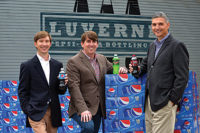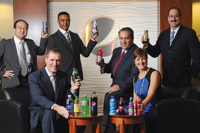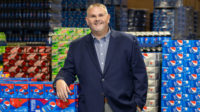2017 Beverage Bottler of the Year: The Honickman Group
East Coast distributor helping to further Balance Calories Initiative
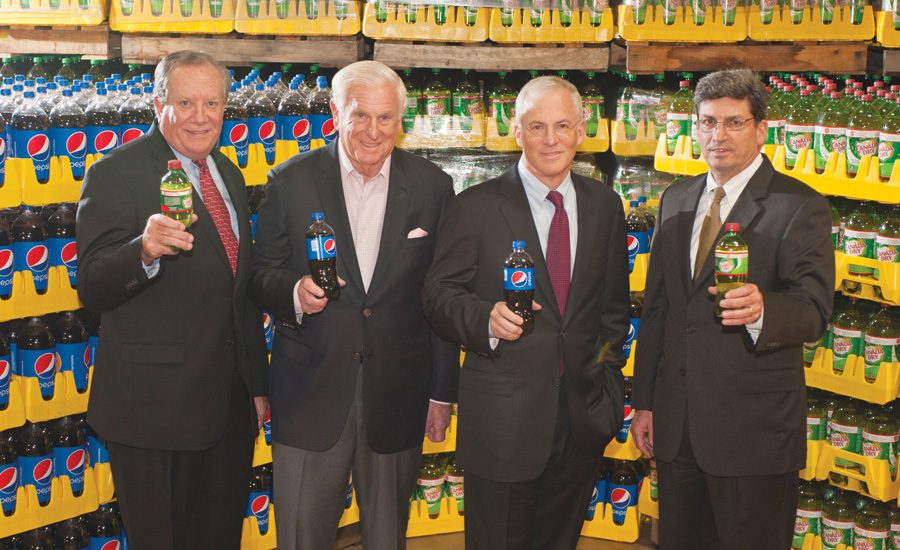
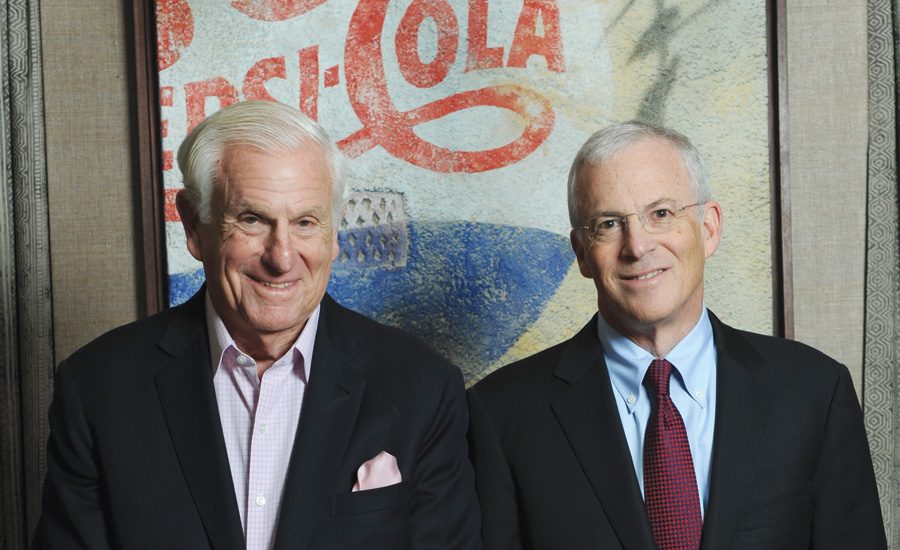
As one of the largest independent bottlers, The Honickman Group of companies, led by Chairman Harold Honickman (left) and Chief Executive Officer Jeffrey Honickman, is helping the community to further its health-and-wellness goals and challenge regressive taxes. (Photo by Susan Farley)

With Bai, The Honickman Group’s Canada Dry businesses have seen growth rates of approximately 100 percent, Bob Brockway notes. (Image courtesy of Bai Brands LLC)

Through its Pepsi businesses, The Honickman Group has seen strong growth from brands like Aquafina and Mountain Dew Kickstart. (Images courtesy of PepsiCo)




As one of the largest independent Pepsi-Cola and Canada Dry bottlers in the United States, Pennsauken, N.J.-based The Honickman Group, not only is making a difference in the territories it serves on the East Coast — New York, New Jersey, Pennsylvania, Delaware, Maryland, Virginia and Washington, D.C. — but also in the broader beverage community.
In addition to being members of the Washington, D.C.-based American Beverage Association (ABA), Jeffrey Honickman, chief executive officer of the group’s Pepsi-Cola & National Brand Beverages Ltd. and Canada Dry Delaware Valley Bottling Co., serves as chair of the ABA’s Board. Additionally, The Honickman Group’s franchisees have been active participants in the ABA’s Balance Calories Initiative and one of its test-and-learn markets: New York.
Bedford-Stuyvesant, an area in Brooklyn, N.Y., is part of the test-and-learn markets and a location that Jeffrey Honickman notes could experience a “tremendous upside” from the Balance Calories Initiative.
“It’s one of the areas where people are more obese than the general population, [and] we’ve been working the program and evaluating [it] over the course [of] the last year, and we think we’ve made a pretty good impact,” Jeffrey Honickman says. “We are promoting more heavily our smaller packages, lower-calorie offerings and we’re starting to see a shift, but it’s a slow shift to be perfectly honest. … You can’t change consumer behavior overnight, but we’re seeing that it’s starting to make a difference.”
Jeffrey Honickman also notes that the Balance Calories Initiative is just one of many progressive efforts that the ABA and its members have embraced in the name of health and wellness.
“Over the years, ABA has staked out leadership positions in several different areas of health and wellness. We started off with the School Beverage Guidelines, and currently we have a [partnership with] the Alliance for a Healthier Generation to take 20 percent of calories and sugar out of our beverages by 2025, and that’s a very significant commitment,” he explains. “To get there, we’re utilizing the Balance Calories Initiative, which is a very significant program to both educate and make consumers aware at the point of purchase of a product’s sugar and caloric content. I think driving programs like this is one of the most important things that we have to do right now.”
Beyond The Honickman Group’s leadership in furthering health-and-wellness measures, the company also is among those challenging the regressive taxes that are plaguing the industry.
For example, in 2016, the Philadelphia City Council passed the Sweetened Beverage Tax, which adds a 1.5 cent-per-ounce excise tax on beverages that contain any sugar-based or artificial sweeteners and are less than 50 percent milk, or 100 percent fruit and vegetable juice. The excise tax is being applied to bottlers and distributors like The Honickman Group.
The Honickman Group is a member of several of the associations that are challenging the measure, which is planned to take effect Jan. 1, in a Philadelphia court. (As of press time, no ruling had been made).
“From our standpoint, we believe a better approach to health and wellness is through education and awareness, [and] through offering smaller portion sizes,” Jeffrey Honickman says. “We think that education and awareness utilizing the Balance Calories Initiative and the addition of smaller portion sizes will have a more material effect on health and wellness than taxing. In the case of the Philadelphia tax, the tax isn’t related to health and wellness, it’s just to raise money for other programs, really important programs, but not programs that are in any way connected to soft drinks.”
The Honickman Group’s leadership in these areas is among the reasons that the bottler was chosen as Beverage Industry’s 2017 Bottler of the Year.
The Honickman Group’s leadership and support in the beverage community also are recognized and celebrated by many of its colleagues and partners. “For more than a decade, I have had the privilege to work on behalf of some of the nation’s most iconic and successful companies and with the support of the dynamic individuals that lead these businesses, like Jeff Honickman,” says Susan K. Neely, ABA president and chief executive officer. “Jeff has been an integral member of ABA’s Board of Directors, which he now chairs, as well as a strong advocate for the industry at-large and a committed community leader and philanthropist. I am proud to call him a colleague and a friend, and congratulate him on this recognition.”
Expansive history
Although The Honickman Group is among the leaders within the independent bottler community, its operations began 60 years ago with just three counties.
“Basically my father was in the [glass] bottle business, and he had a very good relationship with a gentleman by the name of Al Steele, who was married to Joan Crawford at the time,” says Harold Honickman, founder and chairman of Pepsi-Cola & National Brand Beverages Ltd. and Canada Dry Delaware Valley Bottling Co. “He got involved with him back in the ‘40s and they traveled the East Coast with a gentleman by the name of Joe Lapidus, who had a bottling plant in Baltimore, Md., and they would go to the best flavor bottlers in various cities to try and get them to take Pepsi. My dad would give them some bottles, and Joe would give them some Pepsi concentrate, and that’s how they built out the Pepsi business on the East Coast.”
When Harold Honickman completed his military service in 1957, his father asked Steele, who was the chief executive officer of the Pepsi-Cola Co. at the time, to sell him the distribution rights for three counties — Camden, Burlington and Gloucester — in southern New Jersey.
“They had about 200,000 cases and about 30 employees in 1957, and my father-in-law was a builder and part of the deal of getting the distribution rights was to build a small plant in Pennsauken,” Harold Honickman explains. “We built a 40,000-square-foot plant, and we had one bottling line, 30 employees and 17 trucks, and that’s how we started the business.”
Yet, this was just the beginning of Harold Honickman’s involvement in the soft drink bottling business. In 1969, he entered the Canada Dry business with the purchase of its Philadelphia operations. Two years later, Harold Honickman decided he “wanted to sell everything that a consumer could drink,” and entered the private-label business.
“We built a plant in Concordville, Pa., and we started to pack private-label beverages basically for chain stores,” he explains. “We sold that plant after developing about a 25 million case business.”
The business, which included the Vintage seltzer brand, was sold to Cott Corp. in 2001 along with the Concordville plant.
However, this was not Harold Honickman’s only venture in private-label manufacturing. In 1975, he purchased Beverage Capital, which included a RC plant in Baltimore. Because of his franchise contract with Pepsi, the plant was converted to a private-label plant where it contract-bottled Snapple. “This was a 30,000-sqaure-foot plant, and everything we produced in there was for Snapple at the time,” Harold Honickman says.
Following Snapple’s eventual sale to Cadbury Schweppes and what now has become Dr Pepper Snapple Group (DPSG), Plano, Texas, Beverage Capital lost the Snapple contract business. But another opportunity for the company soon followed.
Through a relationship with Darius Bikoff, the founder of Energy Brands, the Baltimore plant began manufacturing vitaminwater. After Energy Brands’ sale to The Coca-Cola Co. in 2007, the company lost that business and closed the plant.
But the contract and private-label endeavors were only a portion of The Honickman Group’s expansion as the majority of its expansions were furthered by its Canada Dry business acquisitions. In the 1970s, it acquired the business in the Delaware Valley; Washington, D.C.; Virginia; and Baltimore, and followed that up with the 1980 acquisition of Canada Dry Bottling Co. of New York. It then purchased the Canada Dry business in north New Jersey in 1985.
The Honickman Group also expanded its Pepsi-Cola operations with the 1984 acquisition of New York bottling operations from Purchase, N.Y.-based PepsiCo. Through a territory sale with Pepsi Bottling Ventures in 2013, the company acquired the Pepsi-Cola distribution rights for Long Island, including Nassau and Suffolk counties, enabling The Honickman Group to serve the entire metropolitan New York area.
Today, The Honickman Group of companies operates two bottling plants, one in Pennsauken and the other in New York, where they manufacture approximately 50 million of the 85 million cases that they distribute each year. The remaining cases are sourced from other suppliers. Together the companies also maintain 15 warehouse/distribution centers and employ roughly 3,000 people throughout all of its operations.
However, Harold and Jeffrey Honickman note that as competitive bottling networks, such as The Coca-Cola Co., embark on refranchising efforts, it could be necessary for the Pepsi-Cola network to embrace a similar organization in order to remain competitive.
“In order to compete more effectively with what Coke is putting together, we think the scale in both our Pepsi-Cola and Canada Dry businesses needs to change because we are now competing with a consolidated Coke bottler that covers an area stretching from New York to Philadelphia,” Jeffrey Honickman says. “It’s one territory for them, and it is disjointed for us. While our DPSG system is mostly consolidated, the carbonated side of the DPSG business and the non-carbonated side of the business are still run separately in the New York metro area.”
“On the Pepsi side of the business, we are the Pepsi-Cola bottler in New York City, but the parent company owns the New Jersey and Philadelphia territories, so we need to coordinate with one another in order to effectively compete with Coca-Cola, which is now a single business unit,” he continues. “We believe that [in the] long haul, particularly with the pressures on the business from a volume standpoint, that consolidation will need to be a serious consideration.”
Harold Honickman adds that as carbonated soft drinks (CSDs) experience contraction due to changing tastes and concerns about sweetener intake (sugar and artificial), consolidated operations will serve as the best way to recapture sales. “If we’re going to compete with Coke, we need to have equal scale, which means having almost the same territory they have,” he says.
Evolving tastes
With 65 percent of The Honickman Group’s sales coming from CSDs, the category still commands the lion’s share of the business. In fact, Pepsi and Diet Pepsi remain two of its strongest selling products. However, like many bottlers, it has seen the category contract in the past few years.
Bob Brockway, president and chief operating officer of Pepsi-Cola & National Brand Beverages Ltd., Canada Dry Delaware Valley Corp., and Canada Dry Potomac Corp., notes that the companies’ combined CSD business is down approximately 2.5 percent this year, and has experienced declines each year for the past seven years.
Although this is concerning from a CSD sales standpoint, the companies’ overall sales for 2016 have remained flat because of growth from other beverage categories.
“The business is flat because the non-carbonated side of our business, the waters, the teas, the juices, the coffees, are up about 3 to 5 percent,” Brockway explains.
In line with beverage consumption trends that are being reported for the United States, bottled water is a category that has posted strong gains for The Honickman Group’s companies. The Pepsi business has seen growth from domestic brands, like Aquafina, while the Canada Dry businesses have had considerable success with imported water brands like Fiji and Evian, Brockway adds.
“[The] bottled water business is a segment of the industry we’re going to continue to participate in aggressively,” he says. “With both our Pepsi and Canada Dry businesses, we have multiple SKUs of water today, and we are adding to that portfolio consistently.”
Jeffrey Honickman highlights that even though these brands each have a base that is small in comparison to CSDs, collectively they are producing meaningful growth numbers.
“Although the base is smaller, when you look at what’s growing the fastest for us from a percentage standpoint, in the New York area, [it’s] our seltzer brands with Schweppes on the Pepsi distribution system and Canada Dry for the Canada Dry distribution system,” he explains. “We’ve seen tremendous growth in seltzer, and we’ve seen strong growth particularly in the high-end of the water business — Evian in our Pepsi business, and Fiji and Core in our DPSG business.”
Other functional water brands like Essentia and Bai, which recently was acquired by DPSG, also are performing exceptionally well. With Bai, the Canada Dry businesses have seen growth rates of approximately 100 percent, Brockway notes.
Ready-to-drink tea and coffee also remain growth drivers for the businesses. “The tea business is doing very well both regionally and nationally,” Brockway explains. “We have Lipton Tea in our Pepsi business; we have Snapple and AriZona Tea in the Canada Dry business. Ready-to-drink tea is certainly an area where we continue to see growth. Another area of growth would be the coffee business represented by the Starbucks – PepsiCo North American Coffee Partnership.”
Within the energy drinks category, the Pepsi business distributes Rockstar and AMP while Canada Dry handles the Venom brand. The Pepsi business also has seen PepsiCo’s Mountain Dew Kickstart, a hybrid energy drink, flourish in its system.
Coconut water has been another category that is growing, and Canada Dry has a distribution agreement with Vita Coco and its portfolio of coconut waters. The coconut water-infused sports drink brand BodyArmor has been a strong growth driver for the company as well.
Regardless of the category, though, Brockway notes that a diverse portfolio has remained valuable for The Honickman Group. “You need to compete in multiple categories to make sure you’re developing not just the volume but the revenue to offset some of the declines in the CSD business,” he explains.
Currently, the companies do not distribute any refrigerated beverages, but as some beverage segments like kombucha and juice smoothies are being embraced by parent companies, The Honickman Group says it is taking a renewed interest.
“Our Canada Dry business participated in a test years ago where we distributed some Tropicana products,” Jeffrey Honickman explains. “It was actually before PepsiCo bought Tropicana. We distributed Tropicana in the Philadelphia area as a test, and we learned a lot, but we also realized that to get deeper into the business, it would take a more significant investment in refrigeration both at the plant level and on our trucks. It is something that we are taking a renewed look at. We see it as a viable option going forward.”
Adding that growth within the company is coming more from the smaller brands, Jeffrey Honickman says that some of its best practices from the Canada Dry businesses are supportive of the smaller brands that are being incorporated within its Pepsi operations. Naked Juice and KeVita, which PepsiCo recently purchased, are emerging brands that The Honickman Group hopes to distribute in the future.
“[W]e’re taking some of the practices that have worked successfully in our Canada Dry business, and we’re trying to incorporate them into our Pepsi business, so that as that business transitions, we can be in a position to capitalize on smaller brands,” he explains. “We would love to have the opportunity to take KeVita and Naked products to market.”
With such a diverse portfolio of SKUs, Brockway admits that industry changes have altered many operations for the bottler. “It’s certainly a more complex business from a manufacturing, warehousing and a distribution standpoint,” he notes.
Jeffrey Honickman adds that this added complexity has challenged the bottler to keep a watchful eye on manufacturing and warehouse operations. “In this new environment, you need to be able to change your lines over efficiently and manufacture utilizing short runs to avoid filling your warehouse up with months and months of raw materials and finished products,” he says.
Organization that works
To go along with The Honickman Group’s diverse portfolio, the markets in which it serves also remain distinct — ranging from metropolitan to suburban.
Jeffrey Honickman highlights the unique nature of New York City in comparison to other markets. “I can’t think of another market in the country where you end up with $1 million a year in parking tickets,” he says.
Because of challenges in getting from one customer to the next as well as the higher costs for fuel, labor and living, the market features a level of complexity beyond most other markets in the United States. However, traffic congestion and higher costs are not the only differences for metropolitan markets.
“We find consumers in the cities tend to shop almost daily, whereas in the suburbs it’s a little more traditional,” Jeffrey Honickman says. “… The packages that we promote and how we promote them is a little bit different in the cities.”
Brockway echoes similar sentiments, “[W]e need to make sure that we are matching our consumer demographics to consumer purchase patterns and the offerings we’re making.”
Just as the bottler sometimes must execute separate go-to-market strategies for the products it carries, the same sensitivity must be applied with the sales of those products. Because the Pepsi-Cola and Canada Dry businesses have separate parent companies — PepsiCo and DPSG — The Honickman Group employs separate sales forces.
“We keep the Canada Dry sales teams and the Pepsi sales teams completely separate,” Brockway explains. “Those sales teams are located at the individual distribution centers. There are 15 distribution centers, [and] those sales teams are headquartered out of those local distribution centers.”
Despite having separate sales forces and separate distribution systems, orders and warehouse operations maintain a unified execution. All sales orders are relayed through wireless transmission to the warehouses, which encompass a warehouse management system, and are selected for upcoming deliveries using voice-pick systems, Brockway and Jeffrey Honickman explain.
Once the orders are communicated to the dispatch center, the company employs a computer software program to build the next day’s individual routes, consolidating them to specific geographic areas. “What that has also allowed us to do is employ some centralized delivery routing,” Jeffrey Honickman explains.
At the end of 2016, the bottler also was able to centralize most of its Canada Dry dispatch operations to its Pennsauken headquarters.
Similar to how consumers’ beverage consumption habits have changed, The Honickman Group recognizes that the outlets in which they purchase those products also is changing. Because of this, the company is taking an even more proactive approach with its partners.
“We are spending a lot of time right now with our franchisors to figure out how to participate in eCommerce in a way that works both for the franchisor and the franchisee,” Jeffrey Honickman says. “We’re actively testing with Pepsi-Cola, DPSG and with Evian. We’re testing and learning with our franchisor partners to figure out what works best, but we truly believe it is a channel that is going to play a big role.
“It’s not a significant piece of our business today, but we look at eCommerce across all categories, and we see how significant it is, and we look at it at other parts of the world and see how significant it is,” he continues. “We’re heading in that direction, so it’s something we need to design for with our partners.”
Yet, with so many changes that have taken place throughout the non-alcohol U.S. beverage market, The Honickman Group feels empowered to continue to bring consumers and customers the products that they want and love.
“I know there are a lot of challenges in the non-alcoholic beverage business, but what makes me feel good about the business is that people aren’t drinking any less,” Jeffrey Honickman says. “Our job is to find the set of products to satisfy consumers wants and demands, and I think the beverage industry, while it is going to morph into different products and different trends, the industry is going to be successful for a long time, and we would like to expand our presence in that industry.” BI
PepsiCo recognizes bottler’s help in health-and-wellness goals
As health and wellness takes on increased significance with consumers, beverage-makers recognize the efforts they need to make in order to support American shoppers. For Purchase, N.Y.-based PepsiCo Inc., its 2025 Performance with Purpose agenda is helping to address that as well as its commitment to the Washington, D.C.-based American Beverage Association’s (ABA) Balance Calories Initiative.
“PepsiCo has been on a journey to transform our portfolio for decades, and we have created food and beverages to meet changing consumer needs by reducing added sugars, saturated fat and sodium, and by developing a broader portfolio of product choices,” says Jen Ryan, director of communications for PepsiCo. “As part of our 2025 Performance with Purpose agenda, we intend to build on this progress over the next decade with plans to further transform our portfolio, as well as a significant expansion of food and beverage offerings containing positive nutrition and a focus on reaching more underserved communities and consumers with healthier choices.
“Through the Balance Calories Initiative, which was established in 2014, we have placed a spotlight on our low- and no-calorie beverage options across the U.S., with an emphasis in five markets that have some of the highest obesity rates in the country,” she continues.
To help spotlight low- and no-calorie beverage offerings, many bottlers are working with retailers and other partners to further this change. “PepsiCo has aligned the support of company-owned and independent bottlers — including The Honickman Group — to support the Balance Calories Initiative,” Ryan explains. “And, through a variety of ways, including in-store merchandising, advertising and incentives, we have developed localized approaches to offer and encourage consumers to choose lower-calorie beverages while still meeting the business needs of our customers.”
Pennsauken, N.J.-based The Honickman Group is among the independent Pepsi-Cola bottlers that are operating within one of the ABA’s test-and-learn markets. In the test and learn markets, local efforts are being made to promote water consumption, low- and no-calorie beverages, smaller-portion options as well as merchandising and product trial efforts to increase interest and awareness of these beverage options.
The initial test-and-learn markets included various parts of Los Angeles, New York City and Little Rock, Ark. The Honickman Group maintains Pepsi-Cola distribution rights throughout the metropolitan New York area. The ABA also has rolled out test-and-learn market efforts in communities in the Mississippi Delta and the greater Montgomery, Ala., areas.
Ryan highlights what the efforts and support of The Honickman Group — Beverage Industry’s 2017 Bottler of the Year — is doing to help drive consumer awareness and education about beverage calorie consumption.
“The Honickman Group has been an invaluable partner to PepsiCo and the broader American Beverage Association,” she says. “With the support of dedicated teams in the Hunts Point, Bronx and Bedford-Stuyvesant, and Crown Heights — Brooklyn neighborhoods — The Honickman Group has engaged dozens of customers, ranging from local supermarkets to classic, NYC-style bodegas, to be part of the Balance Calories Initiative. With tireless effort and perseverance, the teams have taken on the ambitious work to build a foundation of strategies in the marketplace to drive consumer purchase and consumption changes, and we’re incredibly grateful for their partnership.”
Although changing consumer behavior takes time, PepsiCo remains optimistic about the efforts that it and its bottlers are making. “Driving change takes time, but we are encouraged by the early signs we are seeing in the New York City Balance Calories Initiative market,” Ryan says. “We have seen a small reduction in the amount of beverage calories consumed per person and believe that the foundation of strategies set this past year will enable continued progress against our national goal to reduce beverage calories consumed per person by 2025, all while sustainably growing the local business.” BI
At a glance
The Honickman Group:
Pepsi-Cola & National Brand Beverages Ltd. and Canada Dry Delaware Valley Bottling Co.
- Distribution area: New York, New Jersey, Pennsylvania, Delaware, Maryland, Virginia and Washington, D.C.
- Bottling facilities: 2
- Warehouse/distribution facilities: 15
- Cases distributed a year: 85 million (50 million manufactured)
- Employees: 3,000
Looking for a reprint of this article?
From high-res PDFs to custom plaques, order your copy today!





